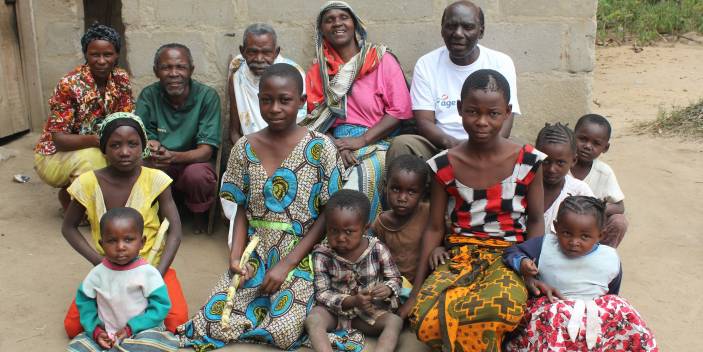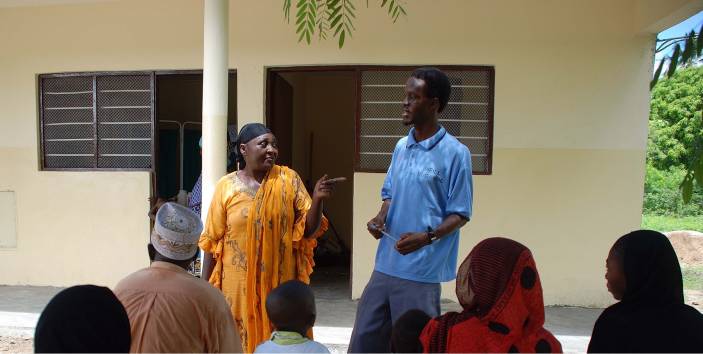
HIV still remains one of the major challenges of the 21st century. This World AIDS Day we stand with the rest of the world in working towards the end of AIDS, as part of the Sustainable Development Goals.
This will not be possible if older women and men are left behind. Their specific needs and challenges, including having to cope with HIV together with other non-communicable diseases associated with ageing, must be addressed.
HIV in Tanzania
Since the first three AIDS cases were reported by the Ministry of Health and Social Welfare in Tanzania in 1983, infections have spread rapidly, leading to an epidemic of devastating impact.
Tanzania responded with diligence, and HIV prevalence has declined from 7% in 2003 to 5.1% in 2012.
Approximately 200,000 of those living with HIV in Tanzania are aged 50 and over, constituting 15 per cent of all people with HIV nationwide. Yet older people have been excluded from basic prevention campaigns.
Studies have shown that older people are less likely to practice safe sex than their younger counterparts – condom use is low due to lower levels of awareness and lower perception of risk. Fewer older people get tested too, leading to late diagnosis and initiation into anti-retroviral treatment (ART).
A study in Mbola in north-west Tanzania highlighted low levels of HIV testing among older people – 9% of people 50 and over had been tested, compared with 24% of people aged 25-49. A HelpAge study also found that 65% of people 50 and over initiating ART began when their immune system was already significantly affected, likely reducing the effectiveness of treatment.

Despite the significant needs to continue the HIV response, funding is declining. A recent statement by the Tanzania Network of Women Living with HIV and AIDS highlighted a funding deficit of TSh 1.2 trillion ($555 million) – equivalent to 45.3% of the budget.
HelpAge and the Southern Africa Development Community (SADC) HIV Fund
Therefore, HelpAge is privileged to be a recipient of the Southern Africa Development Community (SADC) HIV Fund. The two-year funding covers Tanzania, South Africa and Zimbabwe, and we have been implementing a range of activities to promote the inclusion of the 50+ population in the fight against HIV, with potential for their replication in SADC member states.
The project is designed to ensure:
- older men and women have access to information on HIV prevention, access to care and treatment, and support through peer forums
- older men and women have access to age-friendly health and HIV services
- the impact of HIV in households headed by older men and women is mitigated through increased access to economic support
- the project contributes to the generation of evidence and analysis on prevalence and access to services through research and the work of older citizen monitoring groups (OMCGs).
What has the project achieved?
In all three countries, mobilising and training voluntary home-based caregivers, peer educators and older citizen monitoring groups has been a critical approach through demonstrating older people’s leadership and contribution to the HIV response.
In Tanzania, 23 older people’s forums with 299 members have been established, and 18 strengthened. This has led to increased demand from older people over their rights and entitlements in relation to HIV. Steps to implement and adopt age-friendly health and HIV services have been put in place, leading to increased access to services.
OCMG data has shown that 1,201 people were reached with HIV information, resulting in 157 older people accessing HIV testing. This data is being used by older people to campaign and demand improved HIV services for people of all ages. Older peer educators have demonstrated increased knowledge and are able to provide quality information on HIV.
In Zimbabwe, information, education and communication materials and a peer education manual have been developed with messaging targeting older women and men. This focuses on the promotion of voluntary medical male circumcision, prevention of mother-to-child transmission, counselling, correct and consistent condom use, behaviour change and the use of ART in prevention.
An upcoming activity of the project is a six-district study in Tanzania to assess older men and women’s access to voluntary counselling and testing and ART services. The findings will give a clearer picture of the nature of the epidemic among older people, their access and adherence to treatment, and how they can be better supported.
Important work like this must continue, and on World AIDS Day we call upon donors, governments and HIV service organisations to ensure no one is left behind in HIV response.
Find out more:
- Explore our work in Africa.
- Read about what we do in tackling HIV and AIDs.
